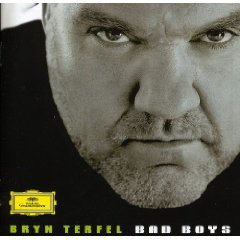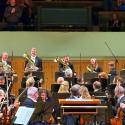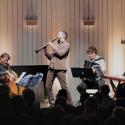Bryn Terfel is a good guy. I know; he never forgets a face, and I’ve seen him making the tea for the entire team at a recording session – no one-off, they assured me. Yet the nature of the bass-baritone beast is given over to more villains than noble souls. The "bad boys" of opera and musical theatre are grist to Terfel’s satanic mill in his latest CD-linked tour. Although inevitably given the demands of live performance there’s less than meets the ear on the disc, Bryn as dark god in concert gives far more than those recent short-shrifting divas Fleming and Gheorghiu.
What a relief, too, that he elects to hold the stage alone, with no guest appearances from lesser voices like Andrea Bocelli or Katherine Jenkins (whose latest album popped up as a "buy together" with the Bad Boys CD when I checked Amazon).
 Indeed, the impression at the Royal Festival Hall was of friendly collegiality with the young, helpfully goodlooking players of Sinfonia Cymru – "the future", said Terfel, "the present," retorted their conductor Gareth Jones - and a rather less incisive mixed choir. Jones, a former long-serving staff member of Welsh National Opera, knew how to raise them to the best in terms of songful phrasing, even if the string sound was sometimes a little thin.
Indeed, the impression at the Royal Festival Hall was of friendly collegiality with the young, helpfully goodlooking players of Sinfonia Cymru – "the future", said Terfel, "the present," retorted their conductor Gareth Jones - and a rather less incisive mixed choir. Jones, a former long-serving staff member of Welsh National Opera, knew how to raise them to the best in terms of songful phrasing, even if the string sound was sometimes a little thin.
Edward Seckerson gently mocked me for caring about the "grouting", and would no doubt do so still further as I put the orchestral cart here before the vocal horse. Yet I’ve not heard Saint-Saens’ Danse Macabre in concert except when it was being massacred by a none too ingenious ukulele orchestra at the Proms. Here the devil’s role was ceded to spirited leader Cerys Jones in the highlight of plums which also included a rather lower-octane Musorgsky Night on a Bare Mountain and three pretty dances from the "Walpurgis Night" scene of Gounod’s Faust (also rare enough fare in the sort of concerts I usually attend).
Otherwise, it was Terfel’s devil who had the best tunes, and he knew how to distinguish between the Italianate snarling of Boito’s Mefistofele, complete with consummate whistling which he told us had terrorised the dogs on his Welsh farm, and a careful foreward placement for the French of Gounod’s version. The first half as a whole showed wise pacing and a judiciously wielded array of props (cloak, bottles, red ribbon, rifle). Wryly addressing the audience as "rustici" – boy, does he know how to work a crowd – Terfel eased us in with the only slightly naughty quack doctor Dulcamara from Donizetti’s L’elisir d’amore (by those standards, I guess he could have admitted his now more weathered Falstaff, too). First to make our flesh truly creep was a commanding Kaspar in Weber’s Der Freischütz, and every nuance of Terfel’s rounded Royal Opera Scarpia came into play for the "Te Deum" from Puccini’s Tosca, an appropriately meaty first-half curtain.
Part Two peaked too soon with the full height and breadth of Iago’s "Credo" from Verdi’s Otello. The centrepiece we missed was a highlight of the CD, Sweeney Todd’s hymn of vengeance on all mankind. Perhaps it will make Deutsche Grammophon think again about making a complete recording of Terfel as Sondheim’s demon barber, a role in which he is unequalled. True, Todd’s "Epiphany" is insanely demanding and so maybe for Terfel to segue from his brief appearance in "The Ballad of Sweeney Todd" to Weill’s "Ballad of Mack the Knife", complete with its suave original orchestration, was a wise idea. Certainly I’ve never heard the "Moritat" delivered with more transparent understanding of Brecht’s throwaway German text, more beauty in the phrasing or more contained, economical menace than here.
Bryn’s memory failed him when he told us that he was delivering his first Gilbert and Sullivan; he sang a truculent Wilfred Shadbolt in the Philips recording of The Yeomen of the Guard, clinging on to his Welshness in the dialogue. Yet he proved a natural delivering a slight parody of aristocratic diction in Sir Roderic Murgatroyd’s "Ghosts’ high noon" from Ruddigore. This also gave the orchestra another chance to shine in some of Sullivan’s most elaborate and witty orchestration. Gershwin’s Sportin’ Life played us out officially, with apologies to tenors for the usurpation and a deftly etched, smoking swagger.
A brief orchestral "rumble" from West Side Story justified a voiceless encore by virtue of the use Bernstein makes throughout of the interval known as the "devil in music". Then what? Not Sweeney again, alas, but Javert’s "Stars" from Les Misérables, a foursquare tune with the voice for the one and only time in need of a microphone. That was enough to bring some members of the audience to their feet. Back at home, I settled instead for one of the great recordings of a show song, "This nearly was mine" from South Pacific on Terfel’s first Rodgers and Hammerstein disc: proof, as if his earlier presentation hadn’t already proved it, that he really is a nice chap after all.














Add comment